Hockey icon and legend
Lester Patrick was born on this date in 1883 in Dummondville, Quebec. After playing at McGill University he starred for Brandon Wheat Cities, who challenged the mighty Ottawa Senators in March of 1904 for the Stanley Cup. It was there that Patrick became acknowledged as the first defenseman to ever score a goal. After playing one season with Westmount Academy in 1905, Patrick signed on to play with the Montreal Wanderers for the 1906 season.
The Wanderers finished second to the Senators during the regular season, but prevailed in the playoffs by dominating the first game of their two-game, total goals series 9-1, and held on for dear life in still one of the most dramatic games in Stanley Cup history when they added an early goal to go up 10-1 in the series only to see Ottawa storm back with nine consecutive goals to tie the series at 10-10. Then, with just a minute and a half left to play, Patrick would score to regain the series lead for the Wanderers and then ice the series with another goal just before the end of the game to not only give the Wanderers the Stanley Cup, but end Ottawa's three year stranglehold on the cup.
The Stanley Cup champion 1906 Montreal Wanderers
After losing the cup to the Kenora Thistles in January of 1907, the Wanderers and team captain Patrick won the Eastern Canada Amateur Hockey Association league title, which earned them the right to a rematch with the Thistles, which they were able to win thanks to a five goal margin after their 7-2 win in Game 1 of their two game, total goals series, as second game went to Kenora 6-5.
Of note, afterwards, the Wanderers brought the cup with them to have a photo taken to commemorate their success, but forgot to take it with them when the photo session was over. The photographer's mother took a liking to her new found silver bowl and decided it would make a wonderful planter and filled it with dirt and geraniums for several months until the Wanderers remembered where they have left it and reclaimed it for its original intended purpose!
The Stanley Cup champion 1907 Montreal Wanderers
The Wanderers also began a tradition with their 1907 victory, as they became the first team to engrave each players name into the cup to commemorate their victory, something which would not become an annual happening until 1924.
The 1907 Wanderers roster engraving
With his father
Joe Patrick moving the family west to pursue new business interests, Lester sat out the 1908 season and played sporadically in 1909. He returned to organized hockey in 1910 when industrialist
Ambrose O'Brien formed the National Hockey Association and brought in the best of the best in an effort to bring the Stanley Cup to his hometown of Renfrew. O'Brien lavished extravagant contracts to
Cyclone Taylor,
Newsy Lalonde, Lester as well as his brother
Frank Patrick, who were all only too happy to accept O'Brien's money.
Such was the amount of money, a record $5,250 to Taylor and $3,000 each for the Patricks for a two-month, 12 game season, the Creamery Kings were dubbed the "Millionaires" by the press. Alas, the club came in third behind the Wanderers and Senators and failed to reach their goal of the Stanley Cup.
The 1909-10 Renfrew Millionaires
The Patrick brothers returned to the west, now joining the family who had moved from Nelson, British Columbia 400 miles further away to Vancouver where they put into motion their plans to form their own league, which included constructing their own arenas, some of the earliest capable of making artificial ice, thanks to their father's financing from profits from his successful lumber business.
Patrick Arena in Victoria, BC
The Pacific Coast Hockey Association was launched in 1912 with three clubs, Frank's Vancouver Millionaires, the New Westminster Royals and Lester's Victoria Senators, for whom Lester was a player, captain, coach, general manager and owner!
The 1912 Victoria Senators - note the 6' 1" Patrick in the back row
Running their own league game the Patricks the freedom to institute new rules, as they were constantly thinking of new ideas to improve the game of hockey, including numbered sweaters, blue lines, penalty shots, credit for assists, changing players on the fly and allowing goaltenders to leave their feet in order to make a save among other innovations.
Lester would play for Victoria, renamed the Aristocrats for 1913-14, for six seasons until the franchise relocated to Spokane, Washington for 1916-17 due to the Canadian military occupying their arena due to World War I. The franchise only lasted one season in Spokane, which led to Lester joining the Seattle Metropolitans for the 1917-18 season.
Lester Patrick with the Seattle Metropolitans
The Aristocrats were revived in time for the 1918-19 campaign, bringing Lester back to Victoria for four more seasons on the ice, which saw his games played dwindle from 11 to 5 to just 2 in 1921-22 before finally retiring from playing in order to concentrate on solely running the club.
With both the Millionaires and Metropolitans from the PCHA having won the Stanley Cup (Vancouver in 1915 and Seattle in 1917), 1925 finally saw Victoria rise to the top of the hockey world as they defeated the Montreal Canadiens of the NHL three games to one.
Lester Patrick's Stanley Cup champion 1924-25 Victoria Cougars
Patrick did return to the ice for one final season in 1925-26, but then retired as a player once again. Despite the success of Victoria, by this time the PCHA was no more, as the size of the crowds were insufficient to support a professional league and the circuit had already been merged with the Western Canada Hockey League in an attempt to survive. After one additional season, the Patricks saw the writing on the wall and stuck a deal to sell their players to the NHL, which used the Cougars roster to stock the expansion NHL franchise in Detroit, which was first named the Cougars in honor of the Victoria club which had supplied them with their roster.
Lester then moved east, and took a position with the upstart New York Rangers as their coach and general manager.
No story of Patrick would be compete without mentioning the famous incident in the 1928 Stanley Cup Finals when starting Rangers goaltender
Lorne Chabot took a puck to the eye and could not continue. When the Montreal Maroons refused the Rangers request to use the Senators
Alex Connell as a replacement, Patrick
donned the pads himself at the age of 44, making "The Silver Fox" the oldest goaltender in playoff history, a mark which still stands today. The Rangers stood tall in front of their coach, forcing the Maroons to shoot from as far away as possible. Although Lester allowed one goal, the Rangers not only won the game in overtime, but they went on to win the Stanley Cup in only their second season of play, albeit with an acceptable substitute in goal for the remainder of the series!
Patrick as the Rangers emergency goaltender in the 1928 Stanley Cup Finals
The Rangers won the title again in 1933, a season which also saw Patrick named club president.
The Stanley Cup champion 1932-33 New York Rangers
Lynn, Lester and Muzz Patrick
Frank later stepped down as coach to focus on his general manager duties, overseeing another Stanley Cup championship in 1940, which saw all three Patricks have their names added to the cup, a tradition which dates back to father Lester's Wanderers.
Lester Patrick tries on the Stanley Cup for size in 1940
Following his departure from the Rangers in 1950, he returned to Victoria, where he oversaw the WHL's Victoria Cougars until his retirement in 1954.
He was inducted into the Hockey Hall of Fame in 1947. In 1966 the
Lester Patrick Trophy was first awarded for outstanding service to hockey in the United States and in 1974, the
Patrick Division of the NHL was named in his honor.
Today's featured jersey is a 1913-14 Victoria Aristocrats Lester Patrick jersey. This sweater was adopted for the franchise's second season after using a barberpole style for the inaugural 1912 season.
Our video section today begins with a look at the Patrick family and their role in the history of hockey.
Next, a look at the 1933 champion New York Rangers, which includes and interview with "their famous coach" Lester Patrick.

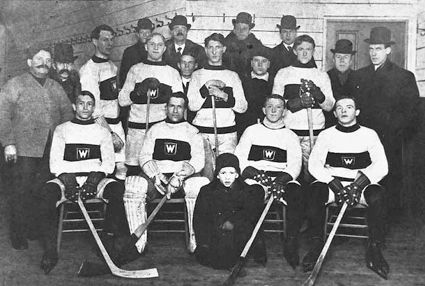
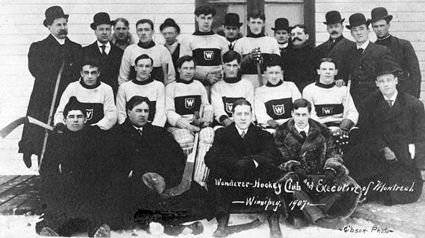
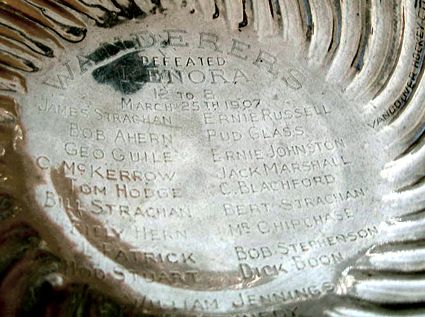
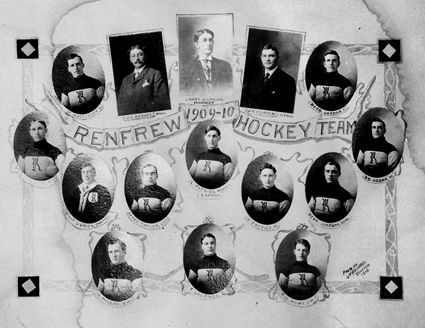
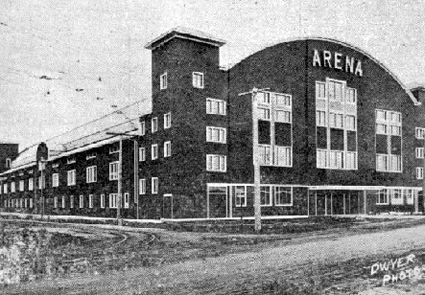
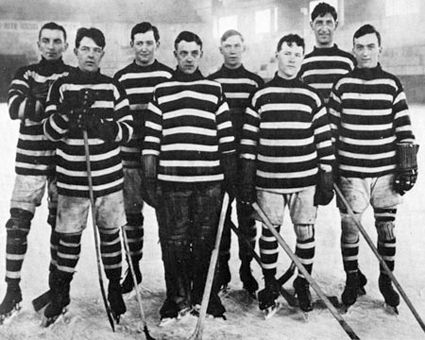
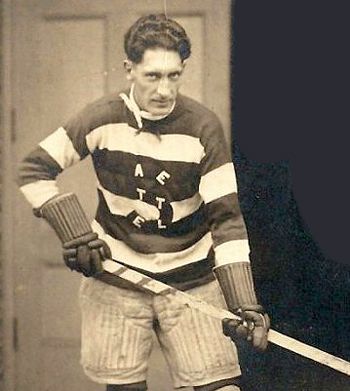
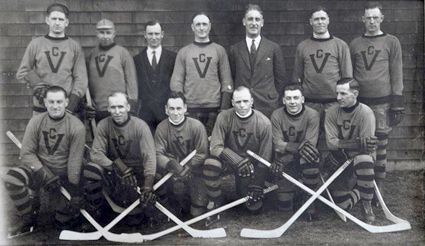
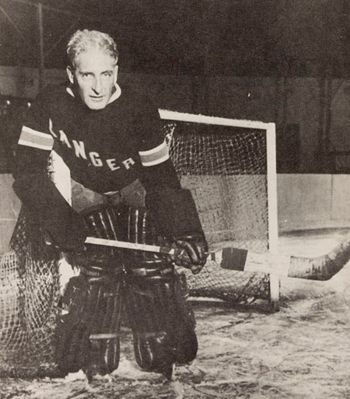
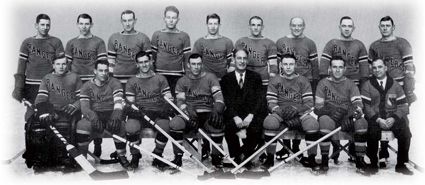
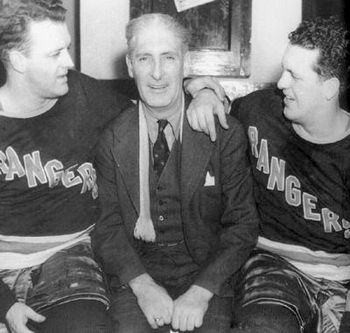
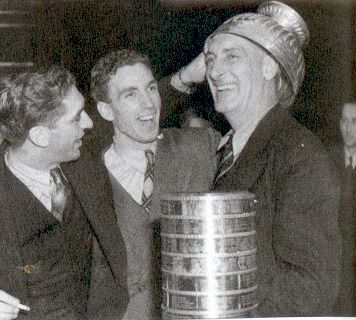

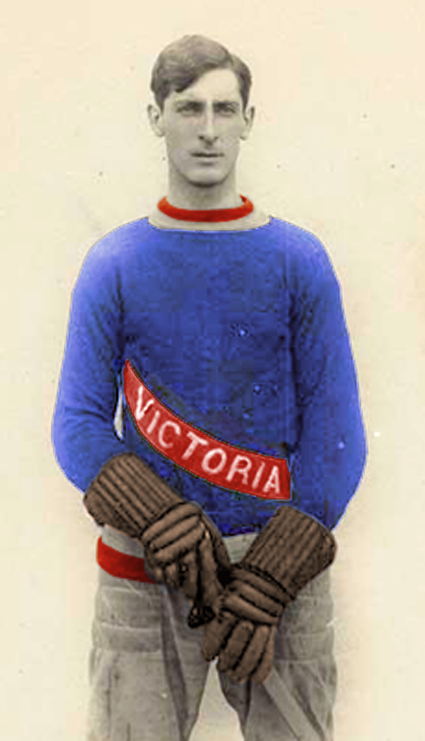










As much as we adore the vintage barberpole style jerseys, we have to admit we're not the biggest fans of the "Miss America sash" look and we're rather relieved that style did not catch on.
ReplyDelete